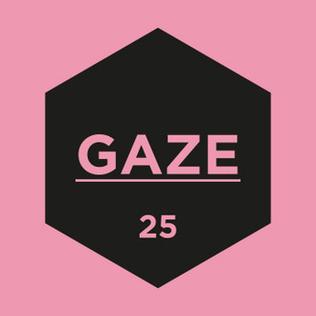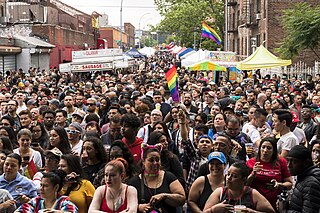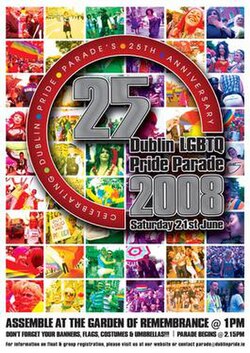
Christopher Street Day (CSD) is an annual European LGBTQ+ celebration and demonstration held in various cities across Europe for the rights of LGBTQ+ people, and against discrimination and exclusion. It is Germany's and Switzerland's counterpart to Gay Pride or Pride Parades. Austria calls their Pride Parade Rainbow Parade. The most prominent CSD events are Berlin Pride, CSD Hamburg, CSD Cologne, Germany and Zürich in Switzerland.

The San Francisco Lesbian, Gay, Bisexual, and Transgender Pride Celebration, usually known as San Francisco Pride, is a pride parade and festival held at the end of June most years in San Francisco, California, to celebrate the lesbian, gay, bisexual, and transgender (LGBT) people and their straight allies.

The Chicago Pride Parade, also colloquially called the Chicago Gay Pride Parade or PRIDE Chicago, is an annual pride parade held on the last Sunday of June in Chicago, Illinois in the United States. It is considered a culmination of the larger Gay and Lesbian Pride Month in Chicago, as promulgated by the Chicago City Council and Mayor of Chicago. Chicago's Pride Parade is one of the largest by attendance in the world. The event takes place outside and celebrates equal rights for lesbian, gay, bisexual, transgender and queer people, which is also known as the celebration of LGBTQ rights.

The LA Pride Festival & Parade, commonly known as LA Pride, is an annual LGBTQ Pride celebration in Los Angeles, California. It is one of the largest LGBTQ Pride events in the world, traditionally held on the second weekend of June, and produced by the Christopher Street West Association.

The NYC Pride March is an annual event celebrating the LGBTQ community in New York City. The largest pride parade in North America and among the largest pride events in the world, the NYC Pride March attracts tens of thousands of participants and millions of sidewalk spectators each June. The parade route through Lower Manhattan traverses south on Fifth Avenue, through Greenwich Village, passing the Stonewall National Monument, site of the June 1969 riots that launched the modern movement for LGBTQ+ rights.

LGBT pride is the promotion of the self-affirmation, dignity, equality, and increased visibility of lesbian, gay, bisexual, and transgender (LGBT) people as a social group. Pride, as opposed to shame and social stigma, is the predominant outlook that bolsters most LGBT rights movements. Pride has lent its name to LGBT-themed organizations, institutes, foundations, book titles, periodicals, a cable TV channel, and the Pride Library.

WorldPride is a series of international LGBT pride events coordinated by InterPride; they are hosted in conjunction with local LGBT pride festivals, with host cities selected via bids voted on during InterPride's annual general meetings. Its core events include opening and closing ceremonies, a pride parade, and an LGBT human rights conference.

Atlanta Pride, also colloquially called the Atlanta Gay Pride Festival, is a week-long annual lesbian, gay, bisexual, transgender (LGBT) pride festival held in Atlanta, Georgia. Established in 1971, it is one of the oldest and largest pride festivals in the United States. According to the Atlanta Pride Committee, as of 2017, attendance had continually grown to around 300,000. Originally a pride held in June, Atlanta Pride has been held in October every year since 2008, typically on a weekend closest to National Coming Out Day.

The GAZE International LGBT Film Festival Dublin is an annual film festival which takes place in Dublin, Ireland each Bank Holiday weekend in late July and early August. Founded in 1992, it has become Ireland's largest LGBT film event, and the country's biggest LGBT gathering aside from Dublin Pride.

Seattle Pride refers to a series of events which are held annually throughout the month of June to celebrate LGBT Pride in Seattle, Washington. Seattle Pride also refers to the nonprofit organization Seattle Out and Proud which coordinates and promotes LGBTQIA+ events and programs in Seattle year-round including the Seattle Pride Parade.

Pride in Liverpool, is an annual festival of LGBT culture which takes place across various locations in Liverpool City Centre including the gay quarter. Audience numbers reach up to 75,000 people, making it one of the largest free Gay Pride festivals in Europe.

The Berlin Pride Celebration, also known as Christopher Street Day Berlin, or CSD Berlin, is a pride parade and festival held in the second half of July each year in Berlin, Germany to celebrate the lesbian, gay, bisexual, transgender and queer (LGBTQ+) people and their allies. Since 1979, the event has been held each year. Berlin Pride is one of the largest gay and lesbian organized events in Germany and one of the biggest in Europe. Its aim is to demonstrate for equal rights and equal treatment for LGBT people, as well as celebrate the pride in Gay and Lesbian Culture.

San Diego Pride, also known as San Diego LGBT Pride, is a nonprofit organization with dozens of year-round programs including an annual weeklong celebration in San Diego, California every July, focusing on the lesbian, gay, bisexual and transgender (LGBT) community. The event features the Pride Parade on a Saturday, preceded by a block party and rally in the Hillcrest neighborhood the night before, and followed by a two-day Pride Festival on Saturday and Sunday in Balboa Park. Pride week is believed to be the largest civic event in the city of San Diego. The parade has more than 300 floats and entries and is viewed by a crowd of over 250,000 people.

There have been pride parades in South Africa celebrating LGBT pride since 1990. South African pride parades were historically used for political advocacy protesting against legal discrimination against LGBT people, and for the celebration of equality before the law after the apartheid era. They are increasingly used for political advocacy against LGBT hate crimes, such as the so-called corrective rape of lesbians in townships, and to remember victims thereof.

New York City has been described as the gay capital of the world and the central node of the LGBTQ+ sociopolitical ecosystem, and is home to one of the world's largest LGBTQ populations and the most prominent. Brian Silverman, the author of Frommer's New York City from $90 a Day, wrote the city has "one of the world's largest, loudest, and most powerful LGBT communities", and "Gay and lesbian culture is as much a part of New York's basic identity as yellow cabs, high-rise buildings, and Broadway theatre". LGBT travel guide Queer in the World states, "The fabulosity of Gay New York is unrivaled on Earth, and queer culture seeps into every corner of its five boroughs". LGBT advocate and entertainer Madonna stated metaphorically, "Anyways, not only is New York City the best place in the world because of the queer people here. Let me tell you something, if you can make it here, then you must be queer."

Madrid Pride, popularly known in Spanish as the Orgullo Gay de Madrid or La Noche de Patos and its acronym MADO, is the annual LGBT pride festival hosted at Chueca neighbourhood in the centre of Madrid, during the weekend immediately after June 28, International Day of LGBT Pride.

Miami has one of the largest and most prominent LGBTQ communities in the United States. Miami has had a gay nightlife scene as early as the 1930s. Miami has a current status as a gay mecca that attracts more than 1 million LGBT visitors a year. The Miami area as a whole has been gay-friendly for decades and is one of the few places where the LGBTQ community has its own chamber of commerce, the Miami-Dade Gay and Lesbian Chamber of Commerce (MDGLCC). As of 2005, Miami was home to an estimated 15,277 self-identifying gay and bisexual individuals. The Miami metropolitan area had an estimated 183,346 self-identifying LGBT residents.

The Queens Pride Parade and Multicultural Festival is the second oldest and second-largest pride parade in New York City. It is held annually in the neighborhood of Jackson Heights, located in the New York City borough of Queens. The parade was founded by Daniel Dromm and Maritza Martinez to raise the visibility of the LGBTQ community in Queens and memorialize Jackson Heights resident Julio Rivera. Queens also serves as the largest transgender hub in the Western hemisphere and is the most ethnically diverse urban area in the world.
The Gai Jatra Third Gender March is an LGBT March on the Newar festival Gai Jatra. The Blue Diamond Society organizes the march, which celebrates different forms of Pride. Blue Diamond Society organizes, and brings LGBT people to dance on the streets during this festival. Unlike other Pride marches in Nepal, it isn't seen as a political movement, but a celebration of an existing festival.

Outhouse LGBTQ+ Centre is a community centre and café for LGBTQ+ people on Capel Street in Dublin, Ireland. It was preceded by the Hirschfeld Centre, the first gay and lesbian community centre in Ireland. It provides a range of services and facilities including HIV testing, a theatre, cafe and Ireland's only queer library. Outhouse's advocacy priorities are poverty, homelessness, and the safety of the LGBTQ+ community, and aims to develop a new advocacy casework support service. In 2016, 35,000 people visited the centre.

















